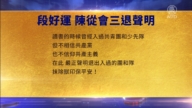【新唐人2012年10月19日訊】《鬼子來了》是中國大陸導演姜文1998年拍攝的影片。這部電影在2000年5月21號獲得法國第53屆「戛納電影節」評審團大獎;2002年,又摘下日本「每日電影獎」最佳外語片大獎,在日本還引發了對戰爭和人性的深沉思考。但是由於不符合中共當局的主旋律,遭到中共廣電總局封殺,沒有能夠在中國上映。日前,「北京電影學院」教授蘇牧在博客上,披露了當年廣電總局對這部影片的「審查意見書」。接下來一起去看看審查內容都說了甚麼?
這份審查意見書說,影片一方面沒有表現出在抗日戰爭大背景下,中國百姓對侵略者的「仇恨和反抗」,反而突出展示和集中誇大了「愚昧、麻木、奴性的一面」,另一方面,不僅沒有充分暴露日本軍國主義的侵略本質,反而突出渲染了日本侵略者耀武揚威的猖獗氣勢,由此導致影片的基本立意出現嚴重偏差。
《鬼子來了》是以一種獨特的視角,來反映抗日戰爭時期,河北一名小村農民和日本兵之間的一段故事。故事取材於作家尤鳳偉的小說《生存》,拍成電影后改動較大。影評人李祥瑞說,原著著重描寫「軍民奮勇抵抗侵略」,而影片則提煉「農民愚昧」、「戰爭荒誕」一面,筆鋒直指國人弱點,將更多憂患意識注入影像化的故事中。原著作者尤鳳偉打官司指控電影對原小說作了扭曲竄改。但李祥瑞認為,其實正因為姜文導演一番大刀闊斧的改動,影片才有了挖掘人性的深度。
大陸詩人和文化評論家葉匡政稱讚《鬼子來了》是1949年以來,中國所拍的最好影片。
文化評論家 葉匡政:「第一,他的片子有一種黑色幽默的性質。第二,他有對國民性的反思。在中國的抗戰電影裡面過去是沒有過的。第三,他展示了一種抗日當年真實的境況。因為中國的抗日電影一直是在一種非常簡單的意識形態,比如仇恨,復仇,英雄或敵人,這樣一個簡單的兩元化框架裡面展示故事的。」
葉匡政說,大陸拍攝的所有跟抗日有關的電影,比如《地道戰》和《小兵張嘎》,都是對抗日戰爭簡單化的意識形態展示。但是《鬼子來了》不同,相對過去的抗戰電影來說,非常真實。
葉匡政表示,文學和藝術一定是多元化的表達。有展示愚昧的,有展示立場堅定的,有不同的角度。而每個國家的歷史中,有部分歷史讓人驕傲,有部分歷史也讓後代感到羞愧。
葉匡政:「在目前的意識形態下,我們通常認為只有展示這個國家讓人驕傲的歷史,才是所謂的優秀電影,其實並不是這樣。其實有的時候展示一個民族苦難的歷史,或一個民族的麻木和愚昧,或者展示一個民族經歷的黑暗,其實有時候更重要。人們對這種麻木,苦難,愚昧的歷史了解的越多,他的良知被泯滅的可能性越小,他才能更好的喚起他對良知和世界真理的渴望。」
葉匡政表示,一百年來,中國歷史上有大量的重大歷史事件,但是大陸的文藝作品一直沒有展現這一百年來中國人的真實感受,尤其苦難。
而《鬼子來了》審評意見書指出的影片許多所謂「嚴重偏差」,其中一條是:國民黨將領召集百姓聚會併發表受降講話時說:「只有國軍才是投降日軍唯一合法的接收者。」意見書認為,這個情節,「沒有達到批判和諷刺國民黨的效果」。有網友表示,這恐怕是這部電影最觸痛共產黨的地方。
採訪編輯/秦雪 後製/王明宇
Movie “Devils on the Doorstep” Banned
The movie “Devils on the Doorstep” was directed
by Jiang Wen in mainland China in 1998.
It received the Grand Jury Award
at the Cannes Film Festival on May 21, 2000.
In 2002, it won the best foreign language movie
at Mainichi Film Awards in Japan.
The win triggered deep thinking within the Japanese people
regarding the war.
However, the film doesn’t comply with the Chinese
Communist Party’s (CCP) rule, and was banned in China.
Recently, Prof. Su Mu at Beijing Film Academy revealed
a report by China State Administration of Radio Film and Television (SARFT).
Let’s take a look.
SARFT’s report claimed that in the film, Chinese people
don’t show enough “hatred and revolt” towards the Japanese.
And instead, they are shown to display
ignorance, apathy and servility.
SARFT also said that the film doesn’t correctly display the
cruelty of the Japanese army.
The film highlights the Japanese flaunting their invasion,
thus the fundamental direction of the film is “incorrect.”
The story is shown from a unique angle.
It tells of the ordeal between a Chinese villager and Japanese
soldiers in a Hebei village during the Anti-Japanese war.
The story is based on the novel “Survival,”
written by You Fengwei.
The movie has a lot of changes
compared to the original novel.
Film critic Li Xiangrui said that the original story emphasizes
Chinese soldiers and civilians courageously resisting the Japanese invasion.
However, the movie picked up villagers’ ignorance of the war,
directly pointing out the Chinese people’s weaknesses, and bringing more sense of apprehension into the story.
The author of the novel claimed
that the film distorted his original work.
However, Li Xiangrui believes that because Jiang Wen made
this brave changes, the movie is able to reveal inside stories.
Ye Kuangzheng, a poet and cultural commentator in China,
praised 『Devils on the Doorstep’ as the best movie since 1949.
Ye Kuangzheng: “First, the film has this black humor nuance.
Second, it is a reflection of national characters.
This has never been shown in past anti-Japanese war films.
And third, it displays the true war situation at that time.
Chinese anti-Japanese movies usually have simple ideology,
showing stories of hatred, revenge, heroes and foes, etc.”
Ye Kuangzheng said that all anti-Japanese war’ films, like
“Tunnel Warfare,” and “Zhang Ga, The Soldier Boy” display simple ideology towards the anti-Japanese war.
However, “Devils on the Doorstep” is different, it is very
genuine and its’ story compares to those of similar films.
Ye Kuangzheng said that literature and art
must show a wide range of expressions.
They should show different angles,
displaying ignorance or a firm stance.
Its like each country’s history –
some can be proud of their past, others can be ashamed.
Ye Kuangzheng: “According to current ideology,
we usually only display what we are proud of.
The film can be claimed as outstanding,
but the facts behind it are not true.
Sometimes to show the history of suffering or a nation’s
apathy and ignorance; or to display a nation experiencing hardship, are more important.
The more there is to understand the history of people’s apathy,
suffering and ignorance, the less humanity they will lose.
Thus, the desire for the truth and conscience
can be awakened.”
Ye Kuangzheng said that in over a century,
many important historical events took place in China.
However, the literary works in mainland China didn’t reflect
Chinese people’s true feelings, particularly their suffering.
However, according to SARFT, “Devils on the Doorstep”
has seriously gone astray.
One of the issues is that a Kuomindang (KMT) general
declares that only the KMT can legally accept the surrender of the Japanese troops.
SARFT claimed that this scene didn’t have the effect
of criticizing KMT.
Some netizens commented that this is maybe
the most painful for the CCP issue with this movie.



























